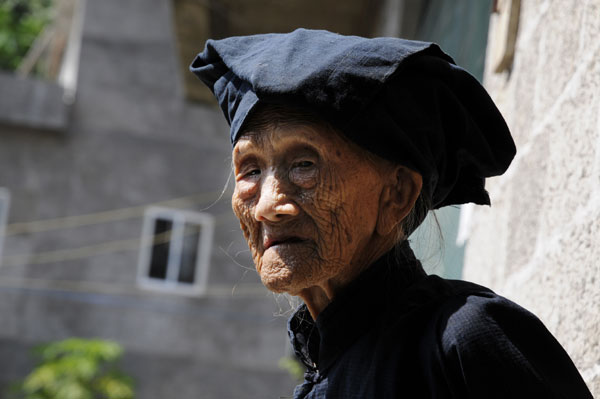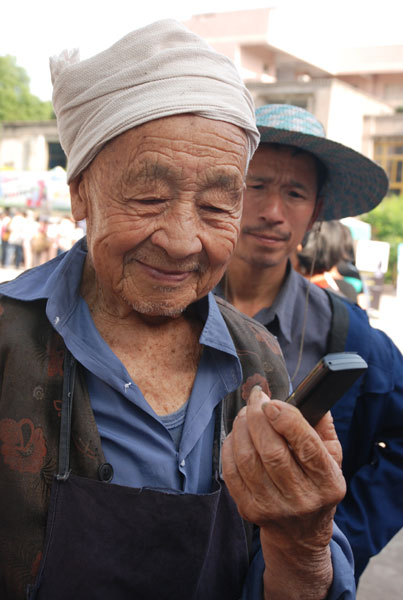Centenarians say age is just a number
Updated: 2012-09-06 09:17
By Xu Wei in Chongqing and He Dan in Beijing (China Daily)
|
||||||||
He estimated that 90 percent of the "long life" areas are secluded, mountainous regions with poor infrastructure and scant contact with the outside world. Zhao believes that the centenarians' secluded lives have contributed greatly to their inner peace, "Some are illiterate and few realize the diversity of the world outside their own limited lives. I have visited a lot of them and many live in very poor housing. Despite that, they seem to be content with their lifestyles."
A harmonious family relationship also seems to play a part in promoting long life:
"If their (centenarians) sons or grandsons frequently aroused anger in them, it would be impossible for them to live so long," Zhao said.
 |
|
Luo Meizhen, 127, is believed to be the oldest person in China. Luo lives in Hechi city, Bama Yao autonomous county in Guangxi Zhuang autonomous region. This photo was taken two years ago. Liang Shaoen / Xinhua |
 |
|
Zhang Yincheng, aged 104, from Chongqing's Jiangjin district, learns how to use a cellphone. Liu Lanbo / for China Daily |
Members of Xu's family said she "has a very good heart and is ready to share whatever she has with family members and neighbors".
Xu has lived in the same dwelling, halfway up a mountain densely covered by forests, for almost 50 years and has always maintained a positive mental attitude, according to her son, 75-year-old Fu Maobing. "She always says that life today is much better than before," he said.
Her diet is simple too, mainly comprising sweet potatoes and vegetables, although the old lady does have a particular fondness for white sugar.
However, not all centenarians maintain a healthy diet, according to Zhao. "Some eat very fatty pork at each meal. Some drink alcohol every day and others even smoke. However, they all eat regularly and no one overeats. Moreover, they are all extremely hard working." Even at an advanced age many continue long-established routines, such as working in the fields and performing household chores.
Zhao's observation was echoed by Zhang Tiemei, a deputy director of the Beijing Institute of Geriatric Medicine at Beijing Hospital and an expert in the study of diseases that afflict the elderly.
"The reasons for longevity are very complicated, and current studies have yet to fully uncover them all," Zhang noted. "But those who are long-lived do share common features, including a positive mental state and a lower than normal intake of calories," she said.
Genetic makeup
Regional longevity is the favored research topic of Yang Ze, also a deputy director at the BIGM at Beijing Hospital. Since 1997, Yang has focused on two counties in the Guangxi Zhuang autonomous region, working on the premise that the centenarians' genetic makeup could be a key factor in their longevity.
Yang's research has centered on the Bama Yao autonomous county, which has long had a reputation for producing the world's longest-lived residents. Even Time magazine commented on it in a 2003 feature, claiming that it was one of the world's top five areas for longevity.
In April, the county - population 250,000 - had 81 centenarians and 712 residents aged between 90 and 99, according to the local publicity bureau, and the ratio of centenarians is higher than in any other county or district in China.
According to Yang's research, about half of the centenarians in Bama have a family history of longevity. "The gene pool is important. Our study shows about half of the centenarians in Bama inherited their longevity from their parents, or have siblings who are also long-lived," he noted.
While studying the genes of local residents, Yang noticed that one - Apolipoprotein E - was prominent among local centenarians. The gene could be helping local oldsters to combat ailments associated with aging, such as senile dementia and cardiovascular disease, according to Yang.
A separate study in the region's Yongfu county in Guilin city, also led Yang to a similar conclusion: "It's all to do with natural selection. In the poorer areas, people who could live with hunger and were immune to certain diseases survived and, over time, their genes were passed down generation by generation," he noted.

 Relief reaches isolated village
Relief reaches isolated village
 Rainfall poses new threats to quake-hit region
Rainfall poses new threats to quake-hit region
 Funerals begin for Boston bombing victims
Funerals begin for Boston bombing victims
 Quake takeaway from China's Air Force
Quake takeaway from China's Air Force
 Obama celebrates young inventors at science fair
Obama celebrates young inventors at science fair
 Earth Day marked around the world
Earth Day marked around the world
 Volunteer team helping students find sense of normalcy
Volunteer team helping students find sense of normalcy
 Ethnic groups quick to join rescue efforts
Ethnic groups quick to join rescue efforts
Most Viewed
Editor's Picks

|

|

|

|

|

|
Today's Top News
Health new priority for quake zone
Xi meets US top military officer
Japan's boats driven out of Diaoyu
China mulls online shopping legislation
Bird flu death toll rises to 22
Putin appoints new ambassador to China
Japanese ships blocked from Diaoyu Islands
Inspired by Guan, more Chinese pick up golf
US Weekly

|

|






